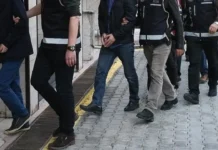YouTube has blocked all three promotional trailers in Turkey for “Exodus,” a movie focusing on the stories of a group of people forced to flee Turkey to seek asylum in Europe, at the Turkish government’s request, Turkish Minute reported, citing the film producers’ social media messages.
“All three trailers of our film EXODUS have been blocked on YouTube in Turkey following legal complaints from government authorities,” the film’s official X account posted.
“Exodus” tells the story of academics, police officers and migrant artists forced to flee Turkey in the years following a coup attempt in 2016 that was followed by a sweeping government crackdown on civil society.
The film criticizes authoritarianism, addressing repression, surveillance and torture under the administration of President Recep Tayyip Erdoğan, according to a review by The Guardian, which described “Exodus” as a “broadside on the authoritarian leanings of Erdoğan’s Turkey.”
The trailer ban continues a pattern of censorship by Turkish authorities, who have in recent years blocked content ranging from social media posts and documentaries to music and films deemed threatening to national unity or “morally inappropriate.”
“Exodus” has already received international acclaim, winning Best Drama Feature at the London Independent Film Festival.
The movie was created by Turkish screenwriters Erkan Çıplak and Refik Güley, producers Murat Kesgin and Ender Zirekoğlu and Cypriot director Serkan Nihat and was chosen among seven nominees as the festival’s opening night film at the Genesis Cinema on April 19 in London.
The film narrates the stories of Havin, a Yazidi woman who survived a sexual assault by Islamic State in Iraq and the Levant (ISIL) militants and tries to escape to Europe; an African named Kembo; Zelal, a Kurdish girl; Hakan Arıkan, a leftist academic fired from a university in Turkey; Mehmet Özdemir, a chief dismissed from the Turkish police force by decree; and a housewife named Nermin and her son Eren.
The film also relates the experiences of Esra Özdemir, who was detained with her daughter solely because she was the wife of a dismissed police officer; explores the challenges faced by a general’s lawyer daughter in her fight against injustice; and addresses the issue of human trafficking.
Shot in London, Cyprus and İstanbul and named after the chapter of the Bible that narrates the flight of Moses from the pharaoh, the film features Denis Oister, Ümit Ülgen, Selen Cabel, Dilan Derya Zeynilli, Murat Zeynilli, Doğa Çelik, Günce Ateş, Gamze Şeber and Azra Çiftçi.
“Exodus” premiered digitally worldwide on June 20, with distribution on streaming platforms including Amazon Prime Video and Apple TV, launching on World Refugee Day.
Turkey’s Justice and Development Party (AKP) government declared a state of emergency following an abortive putsch on July 15, 2016 that remained in effect until July 19, 2018. During the state of emergency, the AKP carried out a massive purge of state institutions under the pretext of an anti-coup fight. More than 130,000 civil servants, including 4,156 judges and prosecutors, as well as 24,706 members of the armed forces, were summarily removed from their jobs for alleged membership in or relationships with “terrorist organizations” by emergency decree-laws subject to neither judicial nor parliamentary scrutiny.
One of those organizations was the Gülen movement, inspired by late Turkish cleric Fethullah Gülen. President Erdoğan has been targeting the group since the corruption investigations of December 17-25, 2013, which implicated then-prime minister Erdoğan, his family members and his inner circle.
Dismissing the investigations as a Gülenist coup and a conspiracy against his government, Erdoğan began to target the movement’s members. He designated the movement as a terrorist organization in May 2016 and intensified the crackdown on it following the abortive putsch in July of the same year that he accused Gülen of masterminding. The movement strongly denies involvement in the coup attempt or any terrorist activity.
In addition to the thousands who were jailed, scores of other Gülen movement followers had to flee Turkey to avoid the government crackdown.
Over the past several years Erdoğan has been widely criticized for mishandling the economy, emptying the state’s coffers and establishing one-man rule in the country where dissent is suppressed and opponents are jailed on politically motivated charges.















